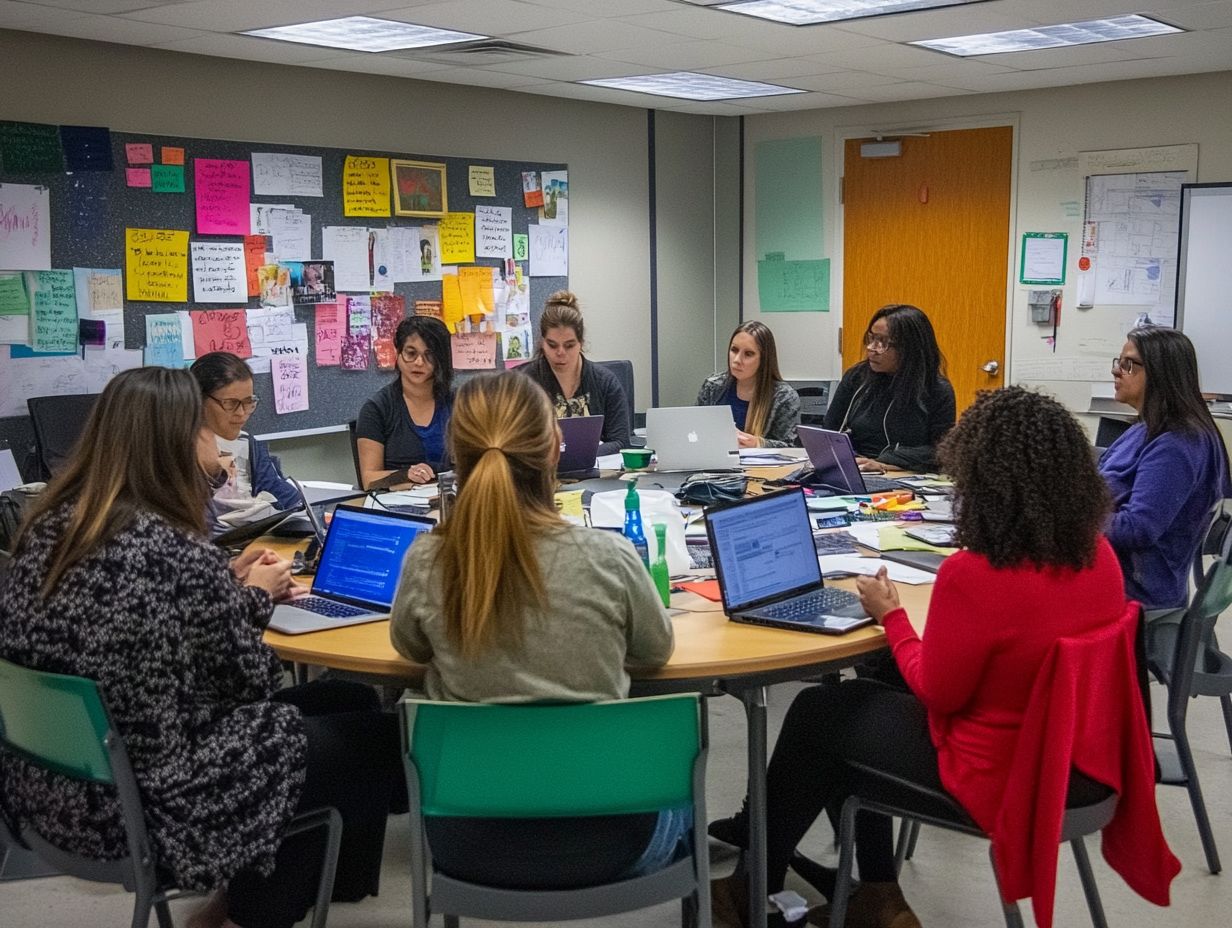Skill Enhancement for Career Changers: A Guide
Considering a career change can evoke excitement. It can also bring trepidation.
As you explore new challenges, seek a better work-life balance, or strive to pursue your passions, transitioning to a new field presents a wealth of opportunities.
This guide will walk you through the essential steps for a successful career shift, starting with identifying and translating your transferable skills and moving on to developing new competencies.
It will also delve into the significance of networking and careful planning, ensuring you are thoroughly prepared for this transformative journey ahead.
Contents
- Key Takeaways:
- Why Changing Careers Matters
- Discovering Your Transferable Skills
- Developing New Skills for Your Desired Career
- Networking and Building Connections
- Utilizing Your Network for Career Change
- Building New Connections in Your Desired Field
- Preparing for the Transition
- Frequently Asked Questions
- What does “skill enhancement” mean for career changers?
- Why is skill enhancement important for career changers?
- How can I identify which skills I need to enhance?
- Are there resources for skill enhancement?
- How long does it take to enhance skills for a career change?
- Can I enhance my skills while working?
Key Takeaways:

Here are some key takeaways for your career change journey:
Why Changing Careers Matters
Changing careers can truly be a transformative experience, allowing you to align your current role with your career goals. This shift can rejuvenate your motivation and satisfaction in your professional life.
By engaging in self-reflection thinking about your own experiences and feelings and assessing your skills, you can craft an action plan tailored specifically to your aspirations. This paves the way for greater job growth and a healthier work-life balance.
This journey ultimately fosters a fulfilling career path. Whether your interests lie in professional development or exploring new job opportunities, realizing the exciting benefits of a career change can serve as your first step toward a more satisfying and rewarding professional journey. Are you ready to transform your career?
Why Consider a Career Change?
In recent years, phenomena like The Great Resignation have prompted you to reconsider your career path and explore the possibility of a change. This wave of introspection often arises from feelings of job dissatisfaction, where a lack of fulfillment in your daily tasks nudges you to seek roles that resonate more closely with your true passions.
Emotional intelligence plays a pivotal role in this journey. It allows you to understand your own motivations and the factors contributing to your unhappiness. You may realize the importance of pursuing work that fulfills not just your financial needs but also your personal aspirations.
In today’s ever-evolving job landscape, the pursuit of a career that embodies your values and interests has never been more essential.
Discovering Your Transferable Skills
Identifying your transferable skills is an essential step in navigating a career change. These abilities can significantly ease your transition to a new job or industry. Skills like communication, organization, adaptability, and teamwork are not only valuable across various roles but also act as a bridge between your current responsibilities and your future aspirations.
By actively engaging in skills assessment and self-reflection activities, you can effectively showcase these skills in your resume and job applications, thereby enhancing your prospects in the competitive job market.
Assessing Your Strengths and Weaknesses
Assessing your strengths and weaknesses through a structured skills assessment can profoundly influence your career transition. This process reveals invaluable insights into areas ripe for professional growth.
This process uncovers your core competencies and highlights potential gaps that could impede your advancement. One effective approach is to gather feedback from colleagues and mentors, as they can provide diverse perspectives on your performance and potential.
Engaging with career coaches can offer you tailored guidance, helping you clarify your goals and prioritize areas for development.
Emphasizing self-awareness is crucial in this context, as it gives you the power to make informed decisions that resonate with both your personal values and professional aspirations. This enhanced self-understanding will significantly bolster your ability to navigate career changes with confidence and success.
Start your journey today!
How to Translate Your Skills to a New Career

Translating your transferable skills into a new career is an essential part of the job search journey to help you frame your past experiences in a manner that resonates with potential employers.
By meticulously analyzing the job descriptions that catch your eye, you can pinpoint the key skills and qualifications emphasized by recruiters. This understanding gives you the power to customize your resumes and cover letters, spotlighting the relevant expertise that aligns perfectly with the position’s requirements.
As you prepare for interviews, it’s vital to express these skills with confidence. Craft compelling narratives that not only highlight your achievements but also illustrate how those experiences can deliver value to the prospective employer.
Keep in mind that a tailored approach can significantly enhance your chances of standing out in a competitive job market.
Developing New Skills for Your Desired Career
Developing new skills is crucial for anyone aiming to transition into their desired career, particularly in today s fast-paced job market.
You may find it necessary to reassess your educational background and seek out learning opportunities, such as online courses or engaging in lifelong learning, to bridge any skill gaps.
This dedication to personal development boosts your employability and showcases your proactive approach to career advancement.
Identifying the Skills You Need
Identifying the skills necessary for your desired career is a crucial step that demands thorough research into the industry and a clear grasp of job responsibilities in that field.
This process involves diving deep into job market trends and exploring various resources, such as industry reports, online job postings, and professional networking sites. By analyzing the qualifications and skills that frequently catch employers’ eyes, you can uncover insights into what s currently in demand.
Conducting discussions with professionals to gain insights about their jobs can provide invaluable firsthand knowledge of essential competencies.
Engaging in a skills assessment will enable you to pinpoint both your strengths and any gaps, guiding you in crafting a tailored action plan to acquire the necessary abilities that will help you flourish in your chosen career path.
Ways to Develop and Enhance Your Skills
You have a wealth of options to develop and enhance your skills, whether it’s enrolling in online courses on platforms like Coursera or seeking coaching support from seasoned career professionals.
Formal education provides structured learning environments that offer in-depth knowledge and valuable credentials. Job shadowing lets you gain practical insights by observing experienced professionals in action.
Mentoring stands out as another powerful avenue, fostering personal growth and confidence through meaningful relationships with industry experts.
By engaging in these diverse approaches, you can tailor your learning experiences to align with your lifestyle and career aspirations, ultimately maximizing your potential and adaptability in today’s ever-evolving job market.
Networking and Building Connections
Networking and cultivating connections are essential for any job seeker aiming to navigate a career change. Building these relationships opens doors to exciting insights and opportunities in your desired field, significantly enhancing your chances of success. Don’t miss out on opportunities!
Utilizing Your Network for Career Change

Utilizing your network effectively during a career transition can boost your job search and foster valuable connections in your desired industry.
Leverage relationships with former colleagues, industry professionals, and friends to uncover potential job opportunities. One effective strategy is to request informational interviews. These conversations provide firsthand insights into various roles and company cultures.
When reaching out, remember that personalization is key. Mention shared experiences or show genuine interest in the other person’s career journey to leave a lasting impression. Actively seek referrals through these interactions to unlock doors that may otherwise remain shut.
A positive employee experience within an organization often translates into referrals. People are more inclined to recommend environments they find rewarding and fulfilling.
Building New Connections in Your Desired Field
Making new connections in your desired field is essential for expanding your professional network and uncovering career opportunities that resonate with your aspirations.
Attend industry-specific networking events to meet like-minded professionals and exchange insights. Engaging with professional associations grants access to exclusive resources, mentorship programs, and invaluable knowledge from seasoned individuals thriving in the sector.
Utilize online platforms like LinkedIn to connect strategically with industry leaders and participate in discussions within relevant groups. Embrace these strategies to cultivate a robust network that supports your career growth and fosters enduring relationships.
Preparing for the Transition
Preparing for a career transition requires a well-rounded action plan that goes beyond outlining your job search strategy. Consider practical aspects such as thorough interview preparation and thoughtful financial planning.
Creating a Plan and Setting Goals
Establishing a structured action plan and clear career goals is vital for a successful transition. These elements offer direction and measurable milestones to track your progress.
This clarity helps identify the skills and competencies you need for advancement. Start crafting a career development plan by assessing your current situation. Reflect on your strengths and pinpoint areas for improvement.
Set SMART goals Specific, Measurable, Achievable, Relevant, and Time-bound to ensure your objectives are realistic and attainable. Regularly assess your motivations to evaluate your personal drivers and keep them aligned with your evolving goals.
Periodically revisit these plans to make adjustments as circumstances change, ultimately enhancing your overall career satisfaction and growth.
Managing the Financial Aspect of Career Change
Managing the financial side of a career change is essential, as it influences your job search and work-life balance during this transitional phase.
Understand budgeting strategies to create a financial plan that eases anxiety and clarifies your situation. Assess your personal savings and expenses to ensure you have a safety net for any potential gaps between jobs.
Explore salary negotiation techniques. Being well-prepared with industry data and articulating your worth can lead to favorable outcomes. Look into financial support systems like unemployment benefits or professional development grants to assist you as you navigate this transformative journey. This support allows you to focus on securing a fulfilling new role.
Start leveraging your network today!
Frequently Asked Questions

What does “skill enhancement” mean for career changers?
Skill enhancement means improving and expanding your skills for a career change. This includes developing new abilities and refining your existing ones.
Why is skill enhancement important for career changers?
Skill enhancement helps you stand out in a competitive job market. It equips you with the skills and knowledge to thrive in a new role.
How can I identify which skills I need to enhance?
Research the job market and requirements for your desired field. Identify in-demand skills and compare them with your current abilities.
Are there resources for skill enhancement?
Yes! Online courses, workshops, and training programs are available for career changers. Consider guidance from career coaches or mentors for personalized support.
How long does it take to enhance skills for a career change?
The time varies based on skill complexity and your prior experience. Set realistic goals and dedicate time to the process.
Can I enhance my skills while working?
Absolutely! Take online courses, evening classes, or weekend workshops. Manage your time wisely to achieve your skill enhancement goals.






